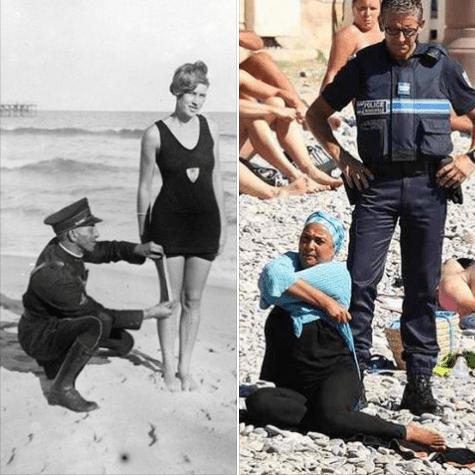
Earlier this week, photos emerged depicting several police officers standing around a woman sitting on a beach in Nice, forcing her to remove her burkini. The head scarf covering, leggings and a loose, long top were considered against ‘respecting good morals and secularism’ in French society.
The ban on the burkini, designed by Lebanese-Australia designer Aheda Zanetti, has been incredibly controversial from the perspective of many for its clear discrimination against Muslim women in particular. This item of clothing was designed for the purpose of allowing Muslim women to engage more in Western culture without feeling like they had to disrespect their own.
Zanetti has argued
“I created [burkinis] to stop Muslim children from missing out on swimming lessons and sports activities.” The ban is not a prevention tool against radicalisation, but “harming the community, taking the beach away from some people and punishing them. That’s just hatred.”
After the terror attack on Nice on July 14 this year, the French belief of keeping religion outside of politics, formally known as laïcité, has become more important than ever. It was argued by the Nice tribunal this week that the burkini has the power to offend the religious status or non-religious beliefs of others at the beach and could be regarded as “a provocation exacerbating tensions held by the community.”
Whilst the Nice tribunal has upheld the ban in the face of public disorders and terrorist attacks on behalf of Jihadists, many are arguing that France is marginalising Muslim women. The impact of causing these people to feel unwelcome can cause withdrawal and increase radicalisation.
The importance of keeping the States secular is an important goal for the French, but should this come at the cost of telling women what they can and cannot wear, especially when their clothes are not the cause of the problem at hand?
John Dalhuisen from Amnesty International has argued that, “French authorities should drop the pretence that these measures do anything to protect the rights of women” as they are in fact “invasive and discriminatory measures” that “restrict women’s choices, violate their rights and lead to abuse”.
Many continue to argue that our entrance into the 21st century has marked a greater step towards gender equity. This ban is a significant indicator that this is not the case as the ban itself “does nothing to increase public safety but a lot to promote public humiliation”.
If you feel like you are being discriminated against based on your religion, or have further comments on this current issue, please do not hesitate to contact our offices on 02 8917 8700.
